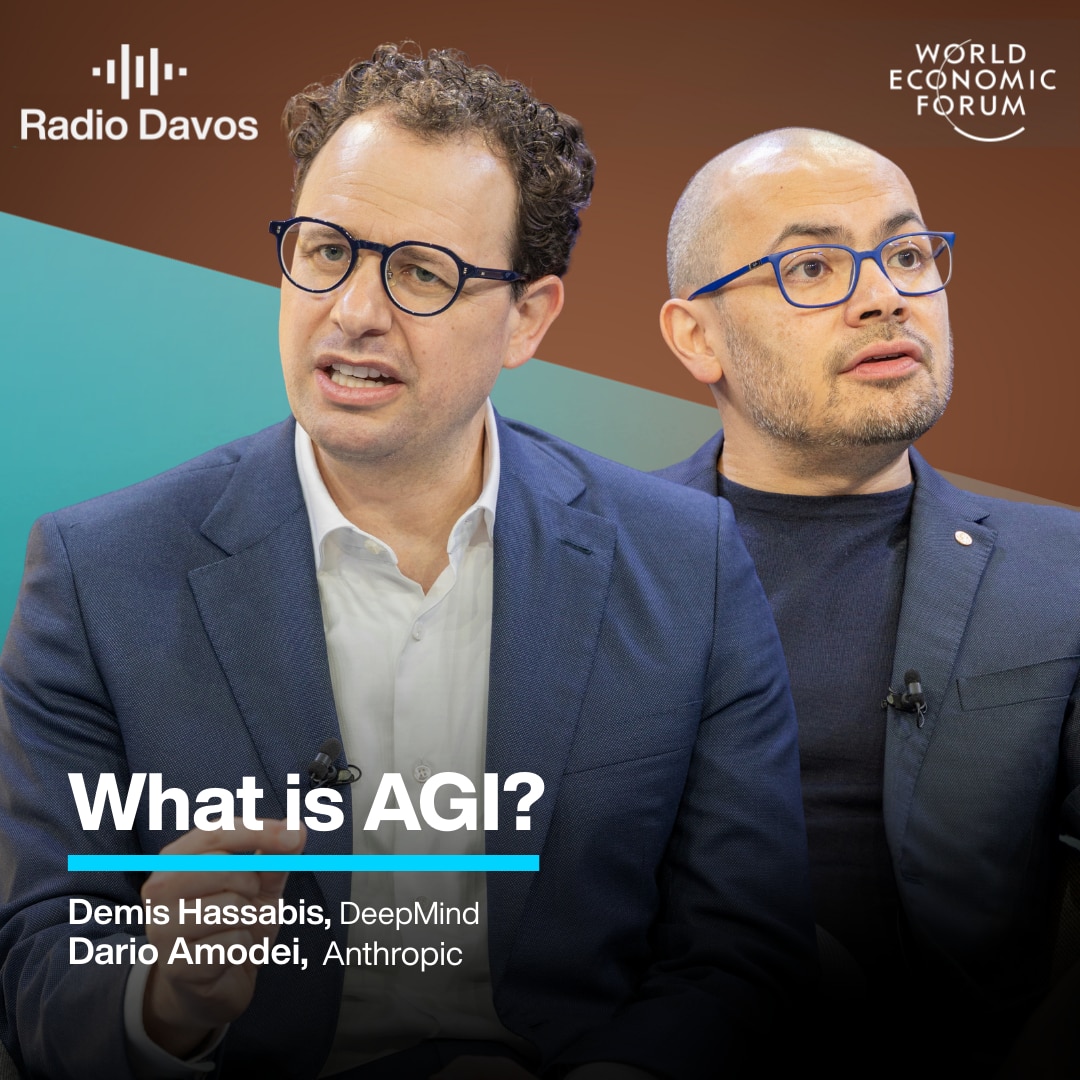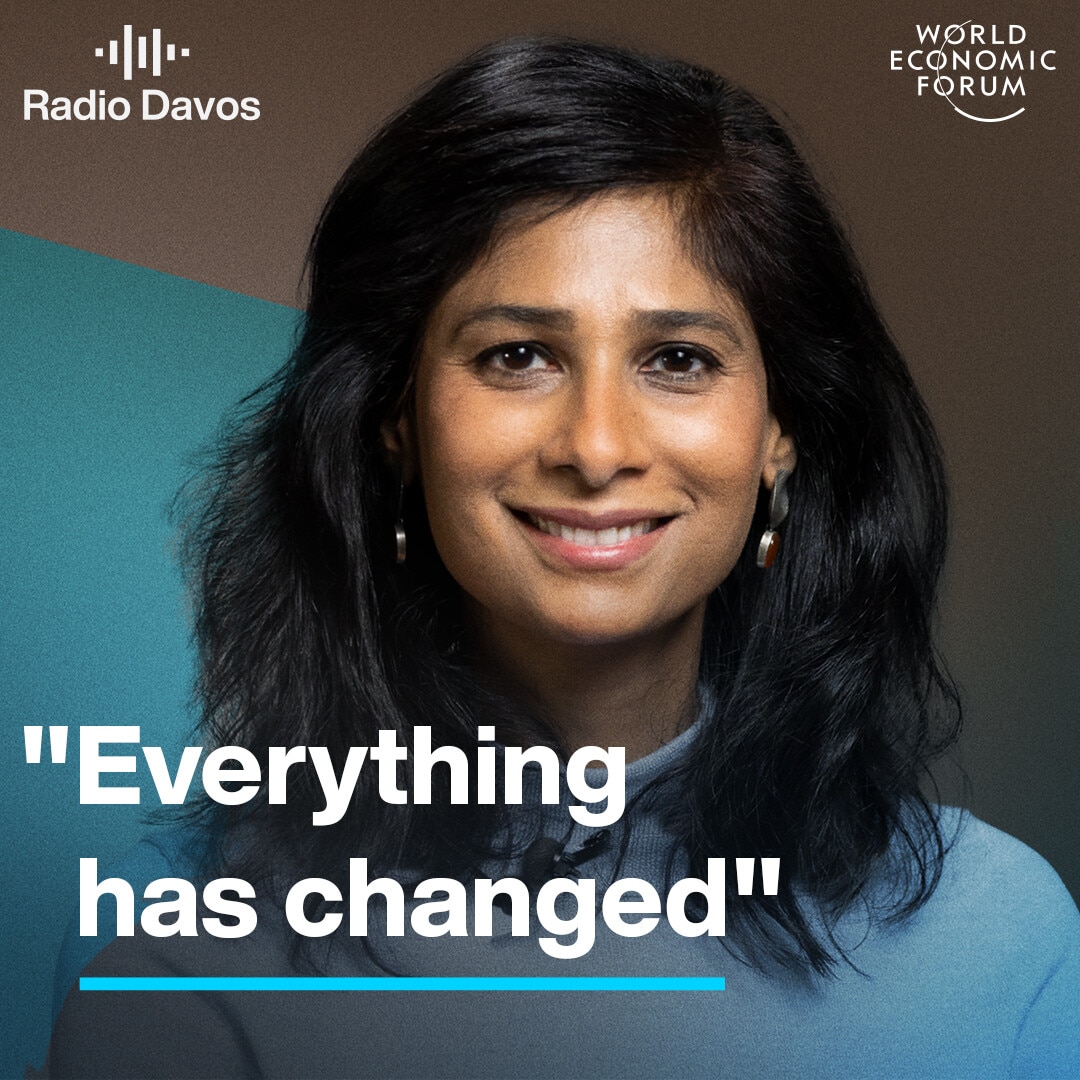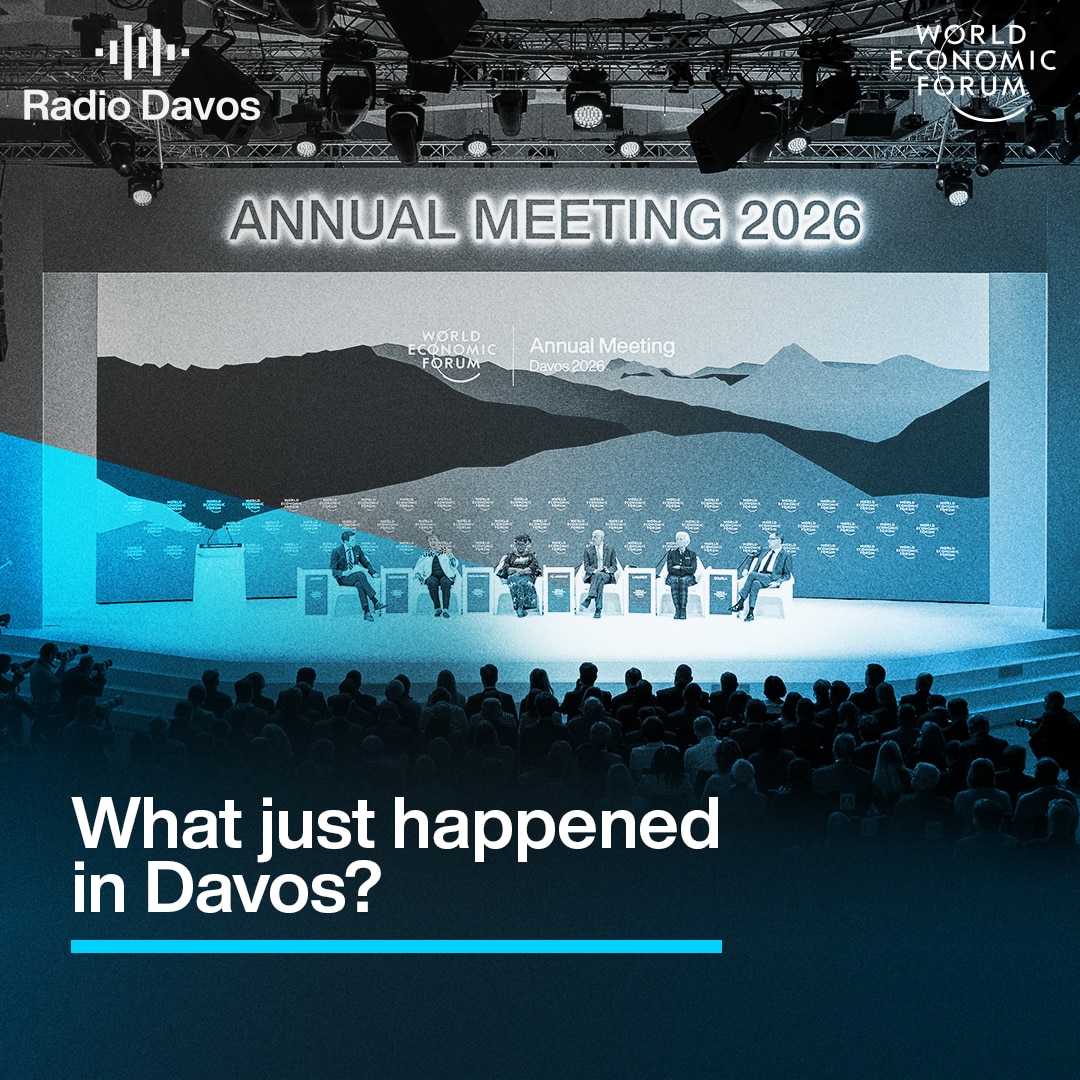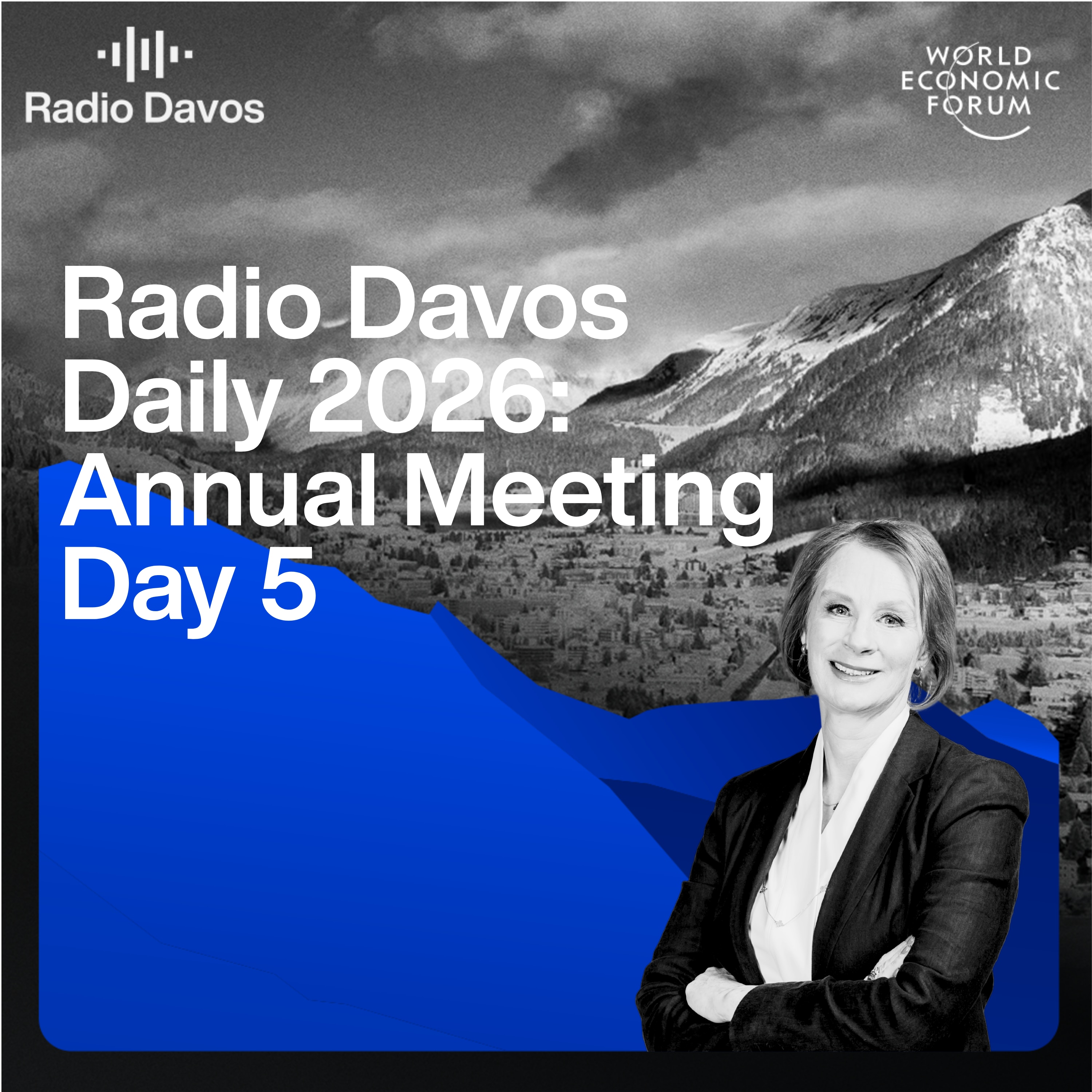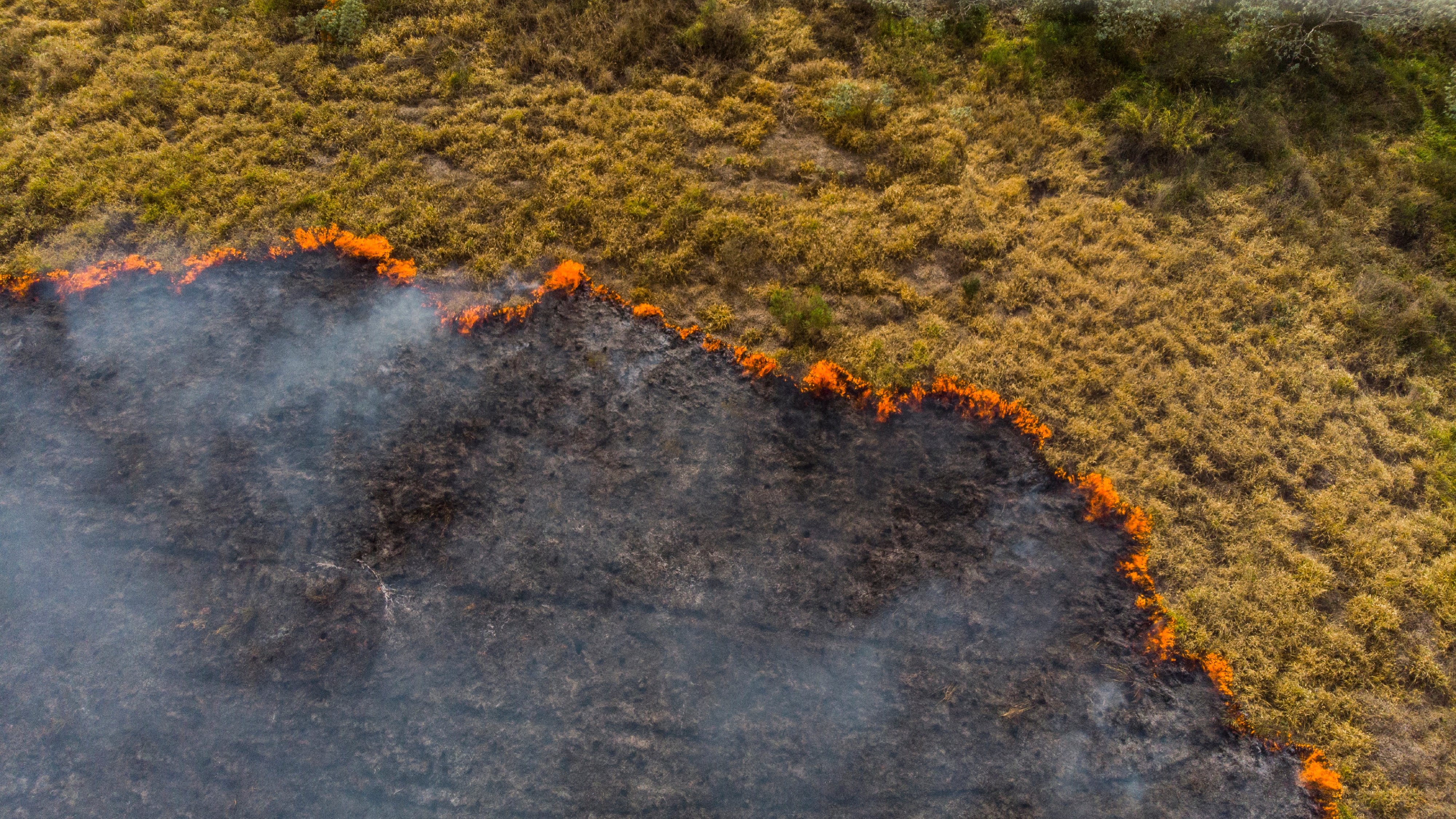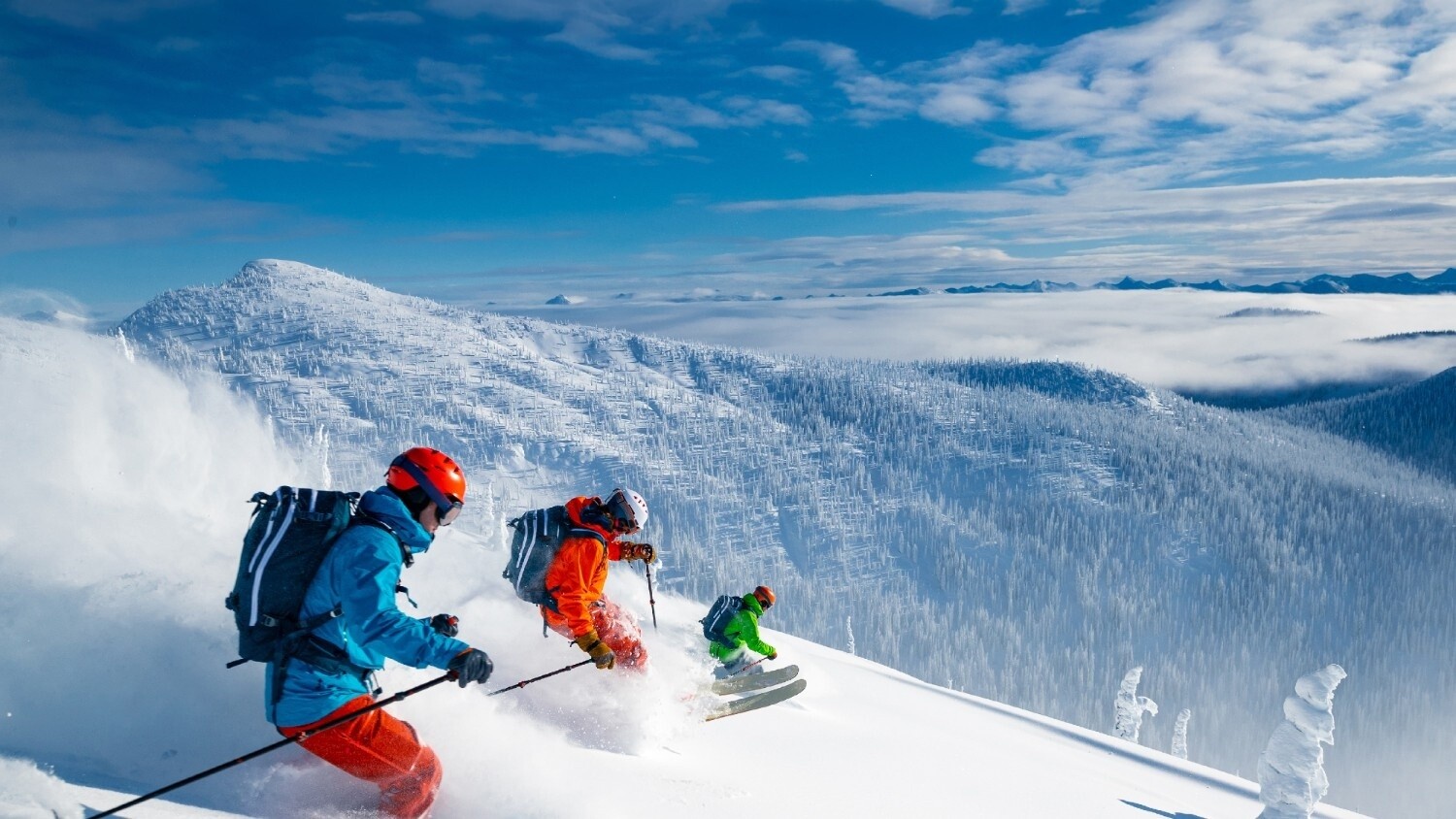Humans rely on the ocean. Here's how both can thrive
播客文字稿
This transcript has been generated using speech recognition software and may contain errors. Please check its accuracy against the audio.
Alfredo Giron, Head of the World Economic Forum’s Ocean Action Agenda and Friends of Ocean Action: There's key industries that depend on the ocean. Transportation, tourism, energy, food, infrastructure, communications. There's so many of those industries that depend on it. What we need to do is to bring on board the private sector and make the private sector learn how much they rely on a healthy ocean.
Robin Pomeroy, host, Radio Davos: Welcome to Radio Davos, the podcast from the World Economic Forum that looks at the biggest challenges and how we might solve them.
This week - the ocean - we rely on it for so much, not least food and for its crucial role in soaking up carbon and regulating the climate. With all those pressures, do we need a new way of protecting the ocean and the vast biodiversity that lives there?
Alfredo Giron: We can not only think about protecting species for the sake of protecting species, extremely important, but it's not going to be the way that we are going to protect most of it. We have to think about people.
Robin Pomeroy: In this episode we explore the idea of creating ‘Marine Prosperity Areas’ where economic activity and human wellbeing go hand-in-hand with ocean protection.
Alfredo Giron: Conservation and ocean use don't have to go against each other. We can put people at the centre of everything and still take care of the ocean and recover fish populations.
Robin Pomeroy: Follow Radio Davos wherever you get your podcasts, or visit wef.ch/podcasts where you will also find our sister programmes, Meet the Leader - interviews with some of the most effective people on the planet - and Agenda Dialogues - the full audio from the most interesting discussions at Forum events.
I’m Robin Pomeroy at the World Economic Forum, and with this look at protecting the ocean through Marine Prosperity Areas…
Alfredo Giron: This is not a dream. This is not an aspiration. This is happening.
Robin Pomeroy: This is Radio Davos
There are a couple of reasons people are giving a lot of thought to the ocean right now. Next month, world leaders will meet at a UN Ocean Conference. In addition to that, British naturalist and broadcaster Davos Attenborough - at the age of 99 - has just released his latest film on the glories of the ocean, and the threats to it posed by humans.
We will be looking at both those things in greater depth on Radio Davos in the coming weeks.
In this episode, we speak to a proponent of a new way of looking at ocean conservation.
Alfredo Giron is head of the World Economic Forum’s Ocean Action Agenda and of Friends of Ocean Action. Earlier this year he co-authored a report that backs the creation of Marine Prosperity Areas - expanses of ocean where conservation measures would focus on protecting nature as a means of boosting local economies and improving people’s lives.
In this interview with my colleague Kateryna Gordiychuk, Alfredo really puts into perspective the massive importance of the ocean to all of life on Earth and why this community-based initiative he talks about could succeed where other efforts have struggled.
Here’s Kateryna.
Kateryna Gordiychuk: We're here to talk a little bit about this new research that got published a few months ago about marine prosperity areas. There is a more known marine protected areas. Framework Can you explain what does this new framework bring to our understanding of the ocean and protection of the oceans?
Alfredo Giron: For decades, we have focused on protecting the ocean because it is important to preserve biodiversity. And we have thought that by protecting the ocean, we can make populations of fish regrow and eventually be so big that they start spilling over. Imagine you have a perimeter and they start spilling it over to communities around. And the theory is that that can boost fisheries, that can create income, that can do other things.
However, that doesn't work all the time. And when we try to take communities to the centre of this, and we focus from the beginning on how can protection also bring prosperity, economic growth, jobs, mental health to the communities, is when we go into this concept of marine prosperity areas.
It is so important that the most successful protected areas in the world are those where the communities have been involved and want to be part of this from the beginning.
Kateryna Gordiychuk: So the people is the key element that was missing in the previous framework. And this one is really trying to incorporate people and communities and wellbeing, importantly, into the conversation.
Alfredo Giron: I don't think it's necessarily that people were left out before. I think people were almost a side benefit of conservation. And there has been a lot of work trying to get people every time a little bit more involved.
But now, we are ready to say, you know what. conservation and ocean use don't have to go against each other. We can put people at the centre of everything and still take care of the ocean and recover fish populations.
Kateryna Gordiychuk: So what does that mean in practise? Does it mean that the communities have to be involved at the very beginning, at the early stages, consulted and sort of the co-creators of the framework in a given place? How can we change the previous framework to incorporate these new elements into it?
Alfredo Giron: Precisely. The main thing that happens with a prosperity focus is that communities have to be involved from the beginning, not only to design and decide where to protect. But also to think through how am I going to benefit from this? How am I to protect? How am i going to recover? But how am I to get benefits from it?
And those benefits don't have to be only monetary, right? They can be, of course, ecotourism and they will create money from that, generate money from it, but they can also be cultural. Am I going protect the species that I care the most about, that I want my children to interact with and to learn about? Am I going to protect the place where I grew up and that I want to see healthy? Am I gonna be able to show it to other people around the world?
And so, this is when prosperity comes to the centre, and this is why it is so important. In fact, There's many examples that are very concrete. Let me talk about two of them.
One of them is in Cabo Pulmo National Park, down in Baja California, southern Mexico. Cabo Pulmo National Park started as a small village that had depleted most of its fisheries resources. And then a group of scientists came together and worked with the community very, very thoroughly to say, how can we recover the populations of fish here in a way that will allow you to have a livelihood for the future, in a way that will recover them and allow you to do diving services.
And so, the very big success here is that after 20 years of protection, the community took it so seriously that they chose the best sites to protect. And they also were the ones who actually made sure that no one came in and fished in there. After 20 years, everything recovered four times what it had been before
And this is now creating almost $8 million of revenues every year from ecotourism activities. That is what this is about. Prosperity means that you protect, but then you also benefit from it. I could give you more examples if you wanted.
Kateryna Gordiychuk: Please.
Alfredo Giron: Another example that is a little bit more nascent today is that in the Pacific island nations, we all know that they are the ones that are the most dependent on the ocean. Many of them hugely affected by sea level rise, and the majority of them actually have more ocean than land. That's the reason why we also call them sometimes large ocean states instead of small island developing states.
And so these large ocean states, in the Pacific in particular, have come together at the highest level. The heads of state have come to say, you know what? We need to care about the ocean, because our economists and our societies depend so much on it that we need to develop a vision for prosperity on the Pacific. And that is how the Blue Pacific Prosperity Initiative was born. And that initiative, precisely, is trying to think about how are we going to protect billions of hectares, if I remember correctly, two billion hectares, are going to be protected but with the vision to create economic returns out of this that benefit all of the communities in the Pacific Islands.
Kateryna Gordiychuk: What I was thinking about when you were giving the first example, in Baja, is that the key part was that the community made sure that nobody came and fished there, that they actually protected the areas that they deemed to be the most important.
How hard is that to do? What needs to happen? What kind of collaboration needs to happen between the community, between the local government, between making sure that the fishers don't fish where they're not supposed to. To actually make sure that these areas remain the way that the communities want them to be seen?
Alfredo Giron: You know, as a budding Ph.D. Student, I did a Ph.D in Marine Biology. And I had the luck of the world when I found a collaborator that was doing her PhD in anthropology at the same time. Because we were able to go to so many communities around the world and try to understand are the communities actually wanting to engage in these processes and is that driving how fish and how other species recover when you protect them.
And what we found is that social cohesion And buy-in into these processes is the most significant driver of ecological restoration.
Why? There's two main reasons. Number one is because when you involve the communities and those communities truly believe in that this can be for the common good, they help you to select the best sites because they know where fish are going to recover fast. That's where they fish. So the first thing is site selection. If they are involved, if they really feel like there's going to be a benefit, they will help you choose the right places.
The second thing is that if they truly believe in it, they are going to want to see it through. And they want to see it through for two reasons.
The first one is because it almost becomes a community pride thing. They want to show that this works and that they selected the right places and that it's going to move forward. The second thing is that it becomes a cultural value. It becomes a way to show their children how to care about things, how to be successful as a community. And eventually, there is very clear evidence that the most successful protection efforts come from communities that are on board from the beginning and that work well with the conservation outcomes.
Kateryna Gordiychuk: So now, what stage are we with this new framework? It's very exciting that it's now being talked about, marine prosperity areas. What needs to happen for it to become broadly accepted? And If it's accepted in some places, how can it serve as an example, just like what you've mentioned to us a couple of times, for the broader communities around the world to implement it?
Alfredo Giron: So, you know, I think it's very important that we recognise where the Marine Prosperity Area sits under the framework of the Convention on Biological Diversity, which is the big convention, one of the big three Rio Conventions that were on climate, on biodiversity, and on desertification.
The one on biodiversity has several targets. One of the most important ones is to protect and restore 30% of land and ocean by 2030. And in order to achieve that, there are several instruments that we need to use. One of them is called Other Effective Conservation Measures. Just to give you an example of something else that sits in those categories, marine protected areas are another one of those categories.
So marine prosperity areas are not here to replace marine protected areas. They serve different purposes. Marine prosperity areas are an example for other effective conservation measures.
Now, how is this going to be implemented? How is this being implemented? You know, there are several countries that are starting to look into this.
We already talked a little bit about the large island states, the large ocean states in the Pacific, really thinking about this towards a 2030 vision. They want to protect 2 billion hectares and create economic returns out of this. And that is already ongoing. This is not a dream. This is not an aspiration. This is happening.
The second example is that we were mentioning Cabo Pulmo before, in which there was a small community that served as an example for the whole of Mexico now. The government just announced that between 2025 and 2030, they are going to establish 10 more marine prosperity areas. And the objective is not so much on the protection itself. The objective is that these benefits 100 communities through that scheme of protection.
So there's examples like that. In Eastern Africa, there's a few other examples that are testing new models to make sure that fisheries also go hand in hand with conservation, especially for some really high value species.
So this is starting, this is just going to continue, and I think that the key is going to be that people benefit from it, and that we can continue to show that conservation and prosperity go hand in hand.
Kateryna Gordiychuk: You know, one of the fundamental things that I was pondering when you were talking, and of course it might sound strange to somebody who works with the ocean every day, is that we are, we all, most people who work on land feel so removed from the ocean, and what this framework really aims to do is to bridge that gap and show that without the ocean we cannot prosper, that the people who depend on the ocean have to be involved in order for us to continue living. Why is that such an important connection that needs to be made when we talk about the ocean?
Alfredo Giron: You know, the way I think about the ocean, how I explain it to my family, is that the ocean is so important to the way we eat. Several billions of people eat seafood as their primary source of protein. To the way we power our systems, the fastest expansion of renewable energy is offshore wind. To the way we transport and you get packages at your home, 80% of global trade is carried by shipping. The way we communicate. Most of the international communications go through underwater cables. Or the way we relax. 50% of global tourism is coastal.
And so I think that most of us think about the ocean as a place where we go on vacation and we don't realise that every time we receive a package at our door, it went through the ocean, most likely, and that it is providing us with so many services that we don't see in our actual economy.
Even leaving alone the services that it provides for our life support systems, the ocean absorbs 50% of carbon dioxide emissions, the ocean produces 50% of the global oxygen in the planet. It's not exactly 50% of what we breathe, that's important. It's 50% of what all life breathe in the planet. And it also absorbs 90% of excess heat.
So, it is extremely important for our life support systems, but it's also extremely important for our economies.
Kateryna Gordiychuk: So what are some of the areas, I think, that connects well to the growth in the ocean economy? What are some areas that we should pay attention to in this?
Alfredo Giron: I think that we have reached a point where we can no longer only talk about conservation of the ocean. And this is also where it ties to prosperity, right? We can not only think about protecting species for the sake of protecting species, extremely important, but it's not going to be the way that we are going to protect most of it. We have to think about people. We have think about benefits to society, benefits to the economy.
And the way in which we are going to be doing this is by understanding that there's key industries that depend on the ocean. Transportation, tourism, energy, food, infrastructure, communications. There's so many of those industries that depend on it. And so if we really want to shift the narrative, what we need to do is to bring on board the private sector and make the private sector learn how much they rely on a healthy ocean.
For example, I don't think that we have estimated the numbers, but it would be very interesting. Do we know how many ships were not able to go into port because there were huge storms that prevented them from coming in? Has that shifted over time? Do we see more and more ships not being able to come on port? What does that mean in terms of our supply chains and the money that we are as a society spending having those ships out there?
So, these are the questions that we need to start solving, and the private sector is key to doing this. However, they cannot do it alone. They need the whole of society to help them with this.
Kateryna Gordiychuk: And of course, that's something that Friends of Ocean network really prioritises, trying to bring these unique voices that are all in different places and have a lot of fun. Different interests to care about the ocean. What has been some of the biggest impact you think of this kind of collaboration and initiative?
Alfredo Giron: Friends of Ocean Action is a network of key champions from around the world that come from industry, from government, from civil society, and even individual people that have just left a huge mark on how we think about the ocean.
And by bringing them together, what we have been able to do is to create that space at the highest level, to position the ocean as a key priority.
Let me just give you an example in 2025, in June 2025. President Macron convened the UN Ocean Conference along with President Chávez from Costa Rica. This was happening in the midst of many, many things happening around the world. But the ocean was one of those lighthouses, those topics that were still inspiring, that we are still a place for convening, that still a way to demonstrate that multilateralism still works and still matters.
And so, Friends of Ocean Action has been largely successful in making sure that that high-level space exists. That we have events like this one, that we have stories that showcase that the ocean can inspire us all.
And just to give you another example I really think that one of the things that would not have happened without the Friends of Ocean Action is that many of the treaties that today are helping us to better govern the ocean were really championed by some of the key members of the Friends of Ocean Action. We are talking about treaties like ending all of the fishery subsidies that harm fisheries and that lead them to unsustainable practises. We're talking about treaties like ending plastics pollution. We're taking about treaties like how are we going to govern those vast areas of the ocean that are not necessarily part of anyone's national waters.
All of those treaties, members of the Friends of Ocean Action community have been instrumental in pushing through and today all of them are coming together and finally creating a cohesive governance structure for the ocean.
Kateryna Gordiychuk: So what do you think have been some of the biggest discoveries that are happening in the ocean space. In either in the past couple of years or some that are still in the works, they haven't really reached yet the the public domain But what are the things that excite you?
Alfredo Giron: There's so many things still to be discovered on the ocean.
I mean, at the Annual Meeting in 2024, we had a session called Life from the Deep Sea. And basically, what we were trying to do was to showcase how much we don't know about the ocean. Every time a submarine goes below 2,000, 2,500 metres, we find new species every single time. Every time that we try to catalogue those species, we realise that we might be even discovering something that we had never seen, a new family, a new genre, new, bigger clusters of life that go beyond a species.
Every time that we explore with detail the bottom of the ocean, we discover new features. We discover new ways in which Earth has been shaping itself. The tectonic plates have been moving, have been creating features that we had never expected to see before.
So there's so many things to discover and I think that the deep sea is that source of inspiration.
However I always like to think about the other things that we might not have discovered yet in terms of how we can interact with the ocean. So, for example, one thing that really excites me about the ocean and innovation in general is that for centuries we have studied the ocean in a ferro way, with cable. We are at the brink of being able to make telecommunications under the ocean wireless. This is one of those super exciting opportunities. Imagine how was life before we had wireless communications on land. That is how revolutionising this can be for ocean science, for ocean exploration, for ocean industries, and just in general for the benefits that the ocean can give to the economy. I think that we are at the brink of something really exciting.
Kateryna Gordiychuk: One of the things that people are talking about on social media is, of course the footage that's never been seen that's in this new documentary Ocean. And some of it shows just the devastation to the bottom of the, to the ocean floor, that causes to different species. Can you please explain why is it so important for people to see that, and what exactly is it that we see?
Alfredo Giron: Bottom trawling is probably one of the most destructive practises for nature, in land or the ocean.
What it actually does, and I really invite everyone to watch the movie, what it actually it does is that a giant net with a lot of weights goes to the bottom of the ocean and then it gets dragged for hundreds if not thousands of metres. Everything that is captured in that dies. And sometimes it goes not only a few centimetres sometimes it can go a little deeper so you can imagine that coral reefs that have been at the bottom are just taken, taken away. You can imagine that all of those flounders, all of those fish that live at the bottom are just captured in the net. And the worst part is not that.
The worst part is that for the majority of activities that require bottom trawling. The trawlers are not going to use everything that they get up, the majority of that is going to become waste, and it's going to be thrown back to the ocean. So bottom trawling is really that kind of practise.
And unfortunately, there are maps, there is science showing that it is not an uncommon practise. A big portion of our ocean has been trawled at least once. And there are parts that are trawled consecutively and constantly. And so there's parts that have never been able to recover since they were first trawled.
Kateryna Gordiychuk: What are the alternatives? What are better ways to treat the ocean? If we are using that ecosystem for food, what are the sustainable practises that are used and are being used and how can we encourage them more around the world?
Alfredo Giron: So the majority of the of the activities that do this in a destructive way happen at an industrial scale. And that is where part of the solution lies.
There has been a lot of innovation and a lot of technologies in thinking about different ways in which the nets can be designed so that they can capture the target species but not damage anything else. And that has to do sometimes with how heavy the net is, that has to do some times with how big are the holes, the threads. That has to do with how long do you do it for or how big is the net overall.
There has been a lot of support for this. There's many organisations, civil society organisations, research institutions, even private organisations that are investing in technologies to do this in a better way.
But if I had to say what is the key to this, is to do it in a very selective and less industrialised way.
And if we are thinking about the arguments for food security, the reality is that the majority of the food that is consumed directly, the seafood that is consumed directly, comes from artisanal fisheries, comes from small scale operations.
The majority of industrial operations are used primarily for feeding cattle, for producing fish flour, or for other indirect uses. This is, in fact, why the World Trade Organisation is working so hard to ratify the fisheries subsidy agreement. Because the first component of that agreement is to deter illegal, unreported and unregulated activities, which we all can agree to, and it is happening already, the ratifications are on track.
However, the second part of the agreement that is still under negotiation is the one about unsustainable fisheries practises. And the majority of that will be targeting industrial operations because those don't contribute as much to seafood security, but at the same time are the ones that have the most destructive practises.
Kateryna Gordiychuk: All of these species that are being caught, everything that's being caught is just being thrown away, it's not being used. So. Is there a way to design a system better if it's indeed being used for food to make sure that all of the catch is being used in a sustainable way, that it's being donated either to local communities or there's some sort of agreements in which it doesn't damage the ocean ecosystem so badly? Do you think there's examples of that being done better?
Alfredo Giron: So another alternative to this will be to try to use more of what we get from the trawl. And one way to think about this is that as you have artisanal operations, you have a little bit more capacity to be more selective and to get value out of everything that you have. So we come back to artisanal fisheries actually provide most of the food for the global population, the seafood, but they also have the most capacity to sustainable because they are artisanal.
The second part of this is that industry, larger industries, are also essential for some parts of our food production systems, and we cannot completely discard that fact. So, for example, at the World Economic Forum, we have been working in collaboration with the World Resources Institute to develop what we call the 100% fish utilisation initiative.
So this started in Namibia. And what we have been doing with the government of Namibia and with several organisations on the ground was to say, can we use everything that comes out of the fishing nets? And we found several challenges. The first one is that not everything is the highest price. So what incentives do companies have to keep it on land, to bring it to land?
The second challenge is that even if you bring it to land, it might not have a client.
And the third challenge is that even if you have a client, it might not be as accessible.
So what we have been doing with this initiative is that we help to understand how can you deal with these products in a way that helps you create even more revenue?
So we started with solutions that go all the way from, okay, maybe you can use the guts and the viscera and the heads to produce other types of products, cosmetics. To produce, I don't know, other types of dishes. For example, in Namibia, we had the good luck that fish heads are actually well appreciated by society. They just don't have the price that the companies were looking for. So how do we create the markets for this? In the case of the scales, we found innovators, some of our entrepreneurs, that were really interested in developing tiles. So that you can use the scales, you can pile them on top of each other and you can produce really high quality and high value tiles. So now the industry has an incentive to bring them on board.
So this is what we have to do. On the one hand, we have focus on those things that provide food security and do it in a more conscious, artisanal way that allows us to select better. On the other hand, we need to be really creative to create market incentives that allow industries and industrial operations to bring more to land and to make money out of it.
Kateryna Gordiychuk: Why is it important to talk about growth in the ocean economy today?
Alfredo Giron: Given that the ocean economy contributes so much to our global economy through transportation, energy, infrastructure, cables, et cetera. It is important to recognise that it has contributed and that it is growing a lot in terms of real economy.
For example, in the last 25 years, it has more than doubled. And the impressive part here is that it has not been happening evenly around the world. Asia-Pacific has been the region where the ocean economy has been contributing the most and growing at the fastest pace.
And what do I mean when I say that there's new growth opportunities? I mean that, for example, offshore wind is the fastest expanding renewable energy source. I mean, for example, that entrepreneurship has attracted several millions of dollars just for the ocean economy. In fact, at the World Economic Forum, we have an initiative called the Thousand Ocean Startups, which convinced most of the investors in early-stage innovation for the oceans, and that together have supported close to 500 startups in the last three years. Imagine where are we going to be by 2030. Hopefully, at least a thousand, as the name of the initiative says.
When we look at the hard numbers, the ocean economy has grown at a higher rate than the rest of the economy. This comes from the OECD, the Organisation for Economic Cooperation and Development. Who just published a report on the growth of the blue economy and really showcased that this is no longer about conservation and restoration only. This is about fueling our economy and using the ocean as an engine for economic growth while caring and regenerating it.
Robin Pomeroy: Alfredo Giron, head of the World Economic Forum’s Ocean Action Agenda and Friends of Ocean Action - find out more about them on our website - links in the show notes.
Look out for more on the ocean - on the UN ocean conference and on the David Attenborough film "Ocean" in forthcoming episodes of Radio Davos - follow us wherever you get your podcasts so you don't miss that, or visit wef.ch/podcasts.
This episode of Radio Davos was presented by me, Robin Pomeroy with reporting by Kateryna Gordiychuk. Studio production was by Taz Kelleher. Radio Davos will be back next week, please join us then, but for now thanks to you for listening and goodbye.
Humans rely on the ocean, not just for food, but for industries such as shipping, telecommunications, and renewable energy - as well as its vital role in absorbing carbon and regulating the climate. Is there a way to make our interactions with the ocean beneficial to the ecosystems?
Alfredo Giron, head of Friends of Ocean Action, believes 'Marine Prosperity Areas' could do just that.
Related video:
Related episodes:
主持::
话题:
自然与生物多样性分享:
更多集:
每周 议程
每周为您呈现推动全球议程的紧要问题(英文)



